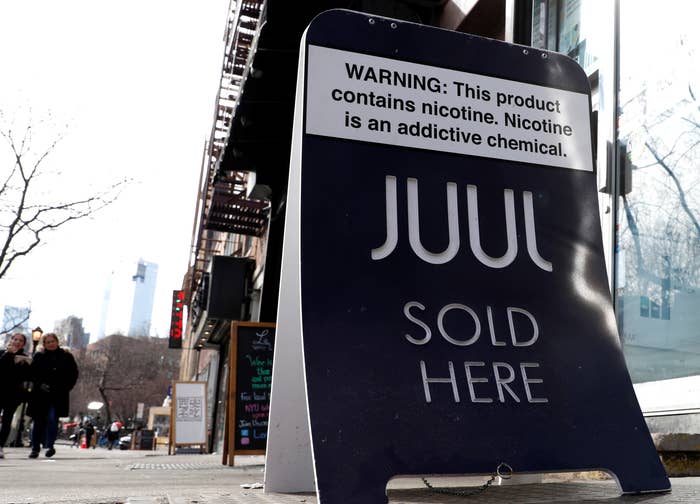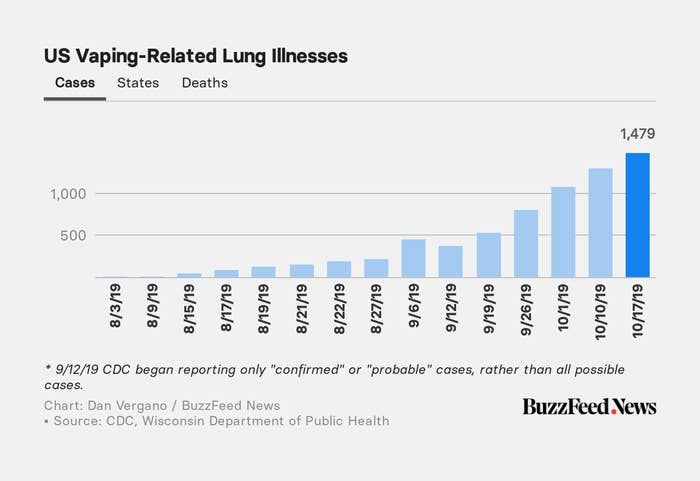
WASHINGTON — Juul’s competitors are blaming the company for the trouble their industry faces, and say they won’t stop selling flavored nicotine pods, despite the e-cigarette market leader stopping such sales.
On Thursday, Juul’s CEO, K.C. Crosthwaite, announced the suspension of sales of mango, creme, fruit, and cucumber flavors (but not mint and menthol flavors also threatened by the Donald Trump administration) in the US. “Given the lack of trust in our industry,” his announcement said, Juul planned to stop sales until the flavors went through an FDA review process to assess their risks to public health. Crosthwaite, a former executive at tobacco company Altria, was recently appointed as CEO of Juul, less than a year after Altria bought a 35% stake in the company.
Juul, which owned 75% of the market share for e-cigarettes in 2018, has become largely synonymous with a growing industry for vaporized nicotine products. But its three main competitors have made no moves to pull their own flavored e-cigarettes, and are attempting to distance themselves from the company, which is under federal investigation for marketing to teens. (All of the firms are owned or partly owned by larger tobacco companies.)
“Juul should speak for itself,” Michele Maron of Japan Tobacco International USA Inc., the tobacco firm that owns the Logic e-cigarette brand, told BuzzFeed News. “The ‘lack of trust in our industry’ referenced by Juul is a direct result of its deceptive marketing activities. Logic’s responsible practice of marketing and selling high-quality vapor products to adults remains unchanged, including flavored products where allowed.”
In September, President Trump said his administration would ban flavored e-cigarettes nationwide. The announcement came days after the FDA sent Juul a warning letter over it marketing its e-cigarettes as a medical tool for smokers to quit without agency approval, and a presentation made by a company representative to a high school that called the device “totally safe.” Since August, the nationwide outbreak of vaping-related lung illnesses — now standing at 1,479 cases and 33 deaths — tied to vaping of illicit THC-containing liquids has led to even tighter scrutiny on the e-cigarette industry.

Fontem, a subsidiary of Imperial Tobacco that manufactures the Blu e-cigarette products, told BuzzFeed News that it planned to keep selling flavored vapes as well.
“Research indicates that access to a variety of flavors is a key factor for those adult smokers who are looking to choose something other than a combustible tobacco product,” said spokesperson Kelly Cushman by email. “In order to preserve options for current adult smokers and vapers, Fontem therefore continues to make responsibly named and marketed flavors available to our customers over approved sales channels."
Vuse, owned by the tobacco firm R.J. Reynolds Vapor Company, did not reply to a request for comment on whether it would continue its flavored vape sales. But as of Friday, the company had made no changes to product availability.
Flavored vapes are widely seen as one of the big draws for teens taking up vaping, which the CDC and other health agencies are warning has increased precipitously — 38% — in the last two years. Nicotine is highly addictive and has been the subject of warnings from the US surgeon general.
Juul suspending the flavor sales in the US is “a good first step,” Kar-Hai Chu of the University of Pittsburgh’s Center for Research on Media, Technology, and Health told BuzzFeed News. But, Chu added, given reports of Juul’s marketing practices overseas, he is concerned that the company is simply writing off the domestic market while using the flavors to hook teens on nicotine overseas.
Juul's explosive growth has largely been driven by high-nicotine products and highly successful marketing campaigns that have played out on social media outlets, such as Instagram and Twitter. The FDA last year sent a warning letter over illegal sales of Juul, Logic, Blu, Vuse, and MarkTen, which together owned 97% of the e-cigarette market, in a crackdown on vaping shops. MarkTen (which is also owned by tobacco company Altria) stopped sales in January.
Juul’s move to stop flavor sales comes as the firm has become the poster child for widespread concern over teen vaping, amid a nationwide outbreak of deadly lung illnesses so far attributed to vaping of illicit THC-containing liquids. But at a congressional hearing on Wednesday, Anne Schuchat, the CDC principal deputy director, suggested that the popularity of e-cigarettes has created a culture of vaping "whatever is in the cartridge" that contributed to the illicit vaping linked to the lung injury outbreak. It was one of two hearings held that day that saw lawmakers calling for bans and stronger regulation of the vaping industry ahead of Juul’s announcement.
Drug policy expert Leo Beletsky of Northeastern University told BuzzFeed News that Juul is “fighting for survival."
He was skeptical of any rush to wholesale ban vaping, saying, “Banning a licit market product will drive people to an illicit market where consumer choice and consumer safety is much more limited.” He noted that the black market is apparently where the outbreak of lung illnesses started — the crisis that has thrust vaping nicotine into the national spotlight in the first place.

